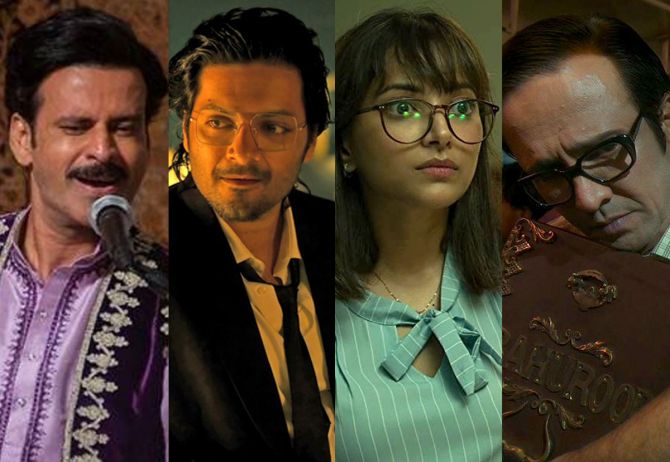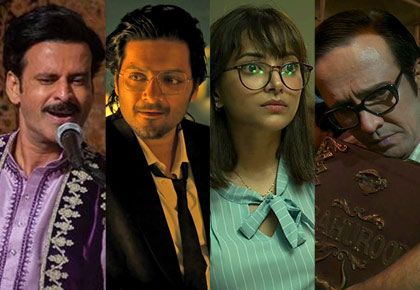As an exercise, Ray is an effort worth encouraging.
As a collaboration, it is a hit and miss, notes Sukanya Verma.

Edgar Allan Poe once said, 'A short story must have a single mood and every sentence must build towards it.'
The consequence is almost always a sharp conclusion characterised by moral, surprise or wit.
When it takes the form of a film though, a story seeks a balance between seeing, sensing and anticipating. But for all their imagination fuelling attributes, literary and cinematic are two distinctly different mediums.
Marrying the fixed to the fluid poses a real challenge for any film-maker, the idea behind turning four of Indian auteur Satyajit Ray’s short stories into Netflix's brand new anthology series called Ray.
Directors Srijit Mukherji, Abhishek Chaubey and Vasan Bala's vision for the film-maker's writing meets with varying degree of success.
Ray's stories are benign, breezy, slice-of-life treading on the peculiar.
In a matter of a few pages, the author lucidly expresses the vagaries and fallibility of the human condition. Their adapted avatar, lasting an hour each, envisions the core of each story in a contemporary context.
Of the four, Srijit Mukherji directs two and adopts a conspicuously dark tone.
His Forget Me Not, based on Bipin Chowdhury's Lapse of Memory has a one-line brief -- Ipsit Nair (Ali Fazal) cannot remember.
Mukherji milks a cocksure corporate hotshot's selective amnesia to the point of monotony. Only a bombshell of a takeaway can pull off such prolonged confusion.
But Forget Me Not's flimsy punchline cannot provide the vindictive mood it sets itself up for.
Watchable entirely on the strength of an able Ali Fazal's growing exasperation, the segment could have made for a glorious allegory for gaslighting.
Mukherji's next, Behrupia, channels Ray's make-up expert protagonist from Chameleon.
Kay Kay Menon plays a complex-ridden agnostic dismissed by the world using his unexpected inheritance and knowledge of prosthetic make-up to reckless effect.
Targeting his mean boss, casual sex partner and an all-knowing mystic, the lines between the man and the mask soon blur.
Full of grisly sex scenes and bizarre posturing, Behrupia is unbearably pretentious from start to finish.
It's a pity to watch one of Ray's best stories reduced to an arty-farty ordeal.
Hungama Kyun Hai Barpa is your reward for enduring it.
Abhishek Chaubey's whimsical adaptation of Barin Bhowmick's Ailment is a clear winner of this anthology and truest to Ray's soul.
Set inside a swanky first-class train compartment traveling from Bhopal to Delhi, it follows the curious exchange between Musafir Ali, a boastful ghazal singer (Manoj Bajpayee) modelling himself on Pakistani singer Ghulam Ali, and Aslam Baig, a former wrestler bestowed with titles like Rustom-e-Patparganj, Kesari Karkardooma, Jenga Pehalwan turned sports journalist (Gajraj Rao).
Drawing its title from Daagh Dehlvi's classic ghazal synonymous with Ghulam Ali, the past, present and future collide across a disarming chain of events sparked off by an antique pocket watch and an amusing psychiatric condition.
The latter is easier to pronounce than Rajesh Khanna's diagnosis in Anand, we are told.
Another Kaka reference pops up when Baig quotes his popular 'kutti cheez' phrase.
Chaubey's quirky humour, love for lyricism and comfort around Urdu speaking characters is unmistakable as is his ingenuity. It's amply visible in the artistic manifestations of Musafir Ali's inner voice, masterstroke cameos from Raghuvir Yadav and Manoj Pahwa or the joyous irony it arrives at towards its satisfying end.
And the glorious jugaalbandi between Bajpayee and Rao, two actors at the peak of their abilities, carry Ray's vision to another level.
Based on a short story of the same name, Vasan Bala's Spotlight leaves a middling impact. More than his story it's Ray's belief in 'improvisation' that guides Bala's take.
When the arrival of Didi (Radhika Madan), a god woman with 245 miracles to her credit, threatens to steal an insecure movie star's (Harshvardhan Kapoor) thunder and coveted 'Madonna' suite, his petulant protests take a trippy turn ensuing in unexpected emancipation and artistic breakthrough.
Ray's Spotlight is tempered with mild deceit and surprise, but Bala's consciously random and audacious interpretation is peppered in pop-culture and parody.
Movie critic Rajeev Masand pitches in an appearance, the Director of Photography is named Byomkesh Bakshi, Bala doubles up as Director Ramen Malik, like a play on Rami Malek or a hat-tip to his fondness for martial arts movies, perhaps.
There's a stoned tribute to Ray's movie titles while the wannabe hero fixates on everyone from De Niro to The Dude.
It's a wacky concept and at the heart of it, Bala is boldly calling out the empty, clueless generation of Kafkaesque nightmare crying fools or hopelessly wholehearted blind bhakts. But Spotlight's energy is off and the farce never registers.
While Radhika Madan has a ball around Spotlight's idiosyncrasies and surreal elements, Harshvardhan is painfully lacklustre. He can neither convey the aura of a pampered star nor the mocking tone.
As an exercise, Ray is an effort worth encouraging. As a collaboration, it is a hit and miss.
Ray streams on Netflix.












